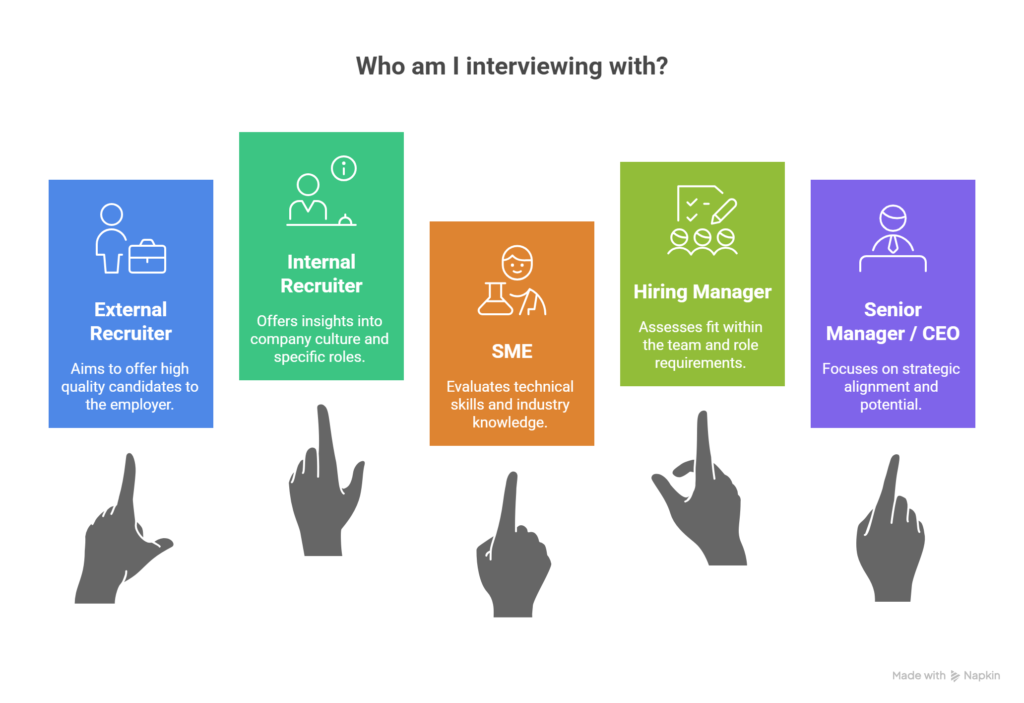You’d be shocked by how many people make basic mistakes in job interviews – even experienced professionals. And some of these mistakes can quietly cost you a brilliant opportunity. And sure – if it didn’t work out, maybe it just wasn’t meant for you. But you can only lean on that logic if you truly gave it your best shot. So levelling up your interview game isn’t optional – it’s a must if you plan on growing in your career.
Hi, I’m Vasil Kostov. I have over 15 years of experience in corporate management. I’ve conducted hundreds of job interviews for a wide range of positions and today I will share a few insights from the other side of the table. We all know that the job market isn’t easy for candidates right now – tighter recruitment budgets, more applicants per role and the most frustrating of all – it’s getting harder to land an interview. So once you do get the chance to speak to a potential employer – those 30 mins matter more than ever. But you know what – it’s tough on the employers’ side too. The candidate pool is crowded, yes, but that doesn’t mean it’s easy to find the right people. And that’s where your opportunity lies – present yourself the right way and you will stand out. So, here’s the big question:
how do you become the one when there are 50, 100, even 300 other applicants?
Who’s Interviewing You – and Why That Matters.
Most hiring processes go through two to six steps, depending on the complexity of the role. Each step often involves a different person, and yes – I know that can feel excessive. But there’s a reason for it. Each step gives a different professional the chance to weigh in and assess whether you and the role are actually a good fit. It’s in everyone’s best interest to get this right – because a bad hire or a bad decision can cost both sides a lot of time, energy, and resources. Some roles are complex, and require a broad mix of skills or qualities that can’t all be evaluated in one meeting.
More importantly, good hiring shouldn’t be rushed. The gaps between interviews give both you and the company time to think, reflect, and assess whether this really feels like the right move. That time is valuable. Use it.

Recruiters (internal or external) are usually your first contact. If they work for an agency, remember: you’re their product. If you get hired, they get paid. They want to pitch you. Even internal recruiters have a target to hit, so they’re rooting for you. But internal ones will be more protective of cultural fit than external ones – because they’re hiring for their own team.
Then comes the SME, the subject matter expert. Their job is to assess your skills. If you have them, great. If not, it’s probably not your role. There’s not much point in overanalyzing that stage.
The hiring manager, though – that’s your golden opportunity. This person is likely your future boss. They have a need. A gap in their team. And they want someone reliable, capable, and easy to work with. Not just someone with the right skills, but someone they can trust to own the work.
Sometimes, you’ll also meet a senior manager or even the CEO. Unless you’re reporting directly to them, their job is usually to approve what’s already been decided by the Hiring Manager and HR. They look for professionalism and presence. And confidence matters a lot here. The more naturally you handle the conversation, the more they’ll trust your potential.
Everyone in the process wants you to do well. They want to fill the role with someone great – someone who will make them look good, too.
What Hiring Managers Are Actually Thinking
Let’s put our cards on the table – time for some insider tips.
Hiring managers generally want to find the right person for the job as quickly as possible, train them as quickly as possible and have them remove some of their own work load – you guessed it – as quickly as possible. Most management positions involve a lot of responsibilities, so it’s crucial to pick the members of their team carefully. Some of the more important questions a Hiring Manager is asking themsleves then recruiting are these:
- Is this person qualified to do the job?
- Would I be able to get along with them and will they respect mine and the company’s instructions?
- Do they seem like they want to come for the long run? – so that I don’t have to do the whole recruiting game again in a few months
- Are they adequate and responsible enough for me to leave them alone without burning down the house?
If you convey the message that hiring you would give a Yes answer to those questions, it means you are a top candidate for the role. Yes, you heard that right – it’s not just about your experience, the languages you speak etc.
It’s about who is the person that we are going to let into our home.
But we can never know that for sure just by a few interviews. This is why when Hiring Managers do get a chance to speak to you – they’ll be looking for the details and try their best to read between the lines.
Why Interviewing Well Isn’t Optional Anymore
Think of the company like a team of racehorses. The owners aren’t just looking to fill a stall. They’re scanning the field for the next rare stallion. If you show up with presence, clarity, and something unique to offer, they’ll notice.
Some numbers, just to give you perspective:
- 70% of hiring managers say candidates fail interviews because they’re simply unprepared.
- 67% note lack of eye contact as a turn-off. 39% say no smile makes a bad impression.
- 76% reject candidates they find arrogant.
- Nearly 180 applicants are submitted for every single hire, on average.
So, the verdict is in: Interviewing well now matters more than ever. What can you do about that ?
How to Stand Out
First, act like you already belong. Use “we” language: “We will serve this type of client,” or “We will collaborate with department X.” Speak as if you already see yourself as part of the team. It subconsciously transfers the feeling to the other side. Refer to your interviewer by name. Create that subtle feeling that you’re already colleagues. To help yourself, research the person who is interviewing you on Linkedin – understand their role and background.
Next, speak in results. Use the action-result framework. “I led project X, and we delivered 23% under budget.” It shows you’re focused, reliable, and data-driven. Avoid sharing anything confidential – it’s an instant red flag. Same as bad-mouthing your previous company – we just don’t do that.
Do your prep as if it’s going to be your first work day. Seriously – if you are coming to interview for a position, what they want to see is that you are invested. You did your homework and you went through all the available data online. Seeing that in you already puts you a few positions ahead of the competition. It means that you didn’t just show up for some meeting you got called to – you targeted our company and your goal is to work here. Now that is something a Hiring Manager will pay attention to. So take the time to really know the company. Check out their LinkedIn. Read their blog. Go through the photos they posted of their last team events – see the profiles of the other employees. Understand their tone. Each company has a vibe. Figure it out, and if it matches your vibe and you can see yourself in those team photos – bring that energy into the room.
Likability Isn’t Optional – It’s a Decider
Be pleasant and presentable. Sometimes just being competent will do the job – specifically for positions that are very hard to recruit. But more often it’s a lot about how you present yourself. Because here’s the deal – people don’t actually know what you can do until you start doing it. So at the interview, they can only know if you are pleasant to communicate with; if you seem like someone who can take instruction or collaborate. If you seem like you actually believe you can do the job. If you are someone who irons their shirt in the morning or even wears a shirt to a job interview. It’s about being someone they’d enjoy working with and later on – trust. That all starts with a smile, a calm presence, and a warm tone.
Being likable is the main advantage you have over the other candidate who has the same qualifications or even stronger ones than you. If it comes down to you and another candidate – both of you qualified and experienced, but you are more pleasant to communicate with – you’ve got the job. Just keep in mind – your personality may help you to get the job, but you will need it to later on keep the job as well.
Treat the conversation as equal. Even if you’re sitting in front of a CEO, you are not there to beg. You’re there to collaborate. Offer solutions and think like a partner because what all hiring managers are looking for in their core is a partnership that will work for both sides.
Close Like a Pro
And just like in a good sales conversation – it’s all about the closing. Don’t just thank them and leave. Summarize your interest, your alignment, and suggest next steps. Something like: “Thanks for the detailed overview. I can really see myself thriving in this role. It plays exactly to my strengths, and I already have some ideas I’d love to share in our next conversation. Looking forward to what’s next.“
That’s how you land it. Some people still think you are not supposed to express too much interest, because it may make you seem desperate – wrong.
Expressed the right way, your interest in getting the job is fueling the interviewer’s belief that you are the right person because
the right person wants the job.
Not arrogance. Not desperation. Confidence, presence, and intent. That’s the energy that wins.
This Is a Two-Way Conversation
A job interview is a two-way communication dance and you’re there to find out if there’s a real match. The hiring team is looking for something specific – and it’s not always just a set of skills. Often it’s something you can’t put in a Resume. A vibe, a chemistry or the feeling that you just know it when you see it. So if you’re not the one they pick, it’s not personal. It doesn’t mean you’re not talented or valuable. It just means this particular company wasn’t your place – and that’s okay.
And it goes both ways – if your gut is telling you “This isn´t it¨ – pay attention. Choosing our next job is one of the most important decisions we ever make, so let’s make sure it feels right. I know – sometimes it may feel like we are out of options…
But the job market tends to reward those who are well prepared and persistant enough.
Final words
What I wish every candidate knew before an interview is this:you and the hiring team have a lot more in common than you think. You’re both looking for the same thing: a kind, capable and loyal partner. Yes, there are bad choices out there on both sides. But there are also some great companies looking for people like you.
So if it feels right – be someone they want to bet on. Come in confident and prepared. Be the person they’ve been searching for, so they can help you build the career you will be proud of.
Sources
- Time.com – “How You Could Botch a Job Interview Without Saying a Word”
- ApolloTechnical.com – “Essential Job Interview Statistics”
- Flair.hr – “Job Interview Statistics: Surprising Facts for 2025”
- CareerPlug (2024–2025 Data) – “Hiring Metrics Benchmark Report”
- Press.RobertHalf.com – “Hiring Headaches: 93% of Managers Say the Process Takes Longer Than Two Years Ago”





